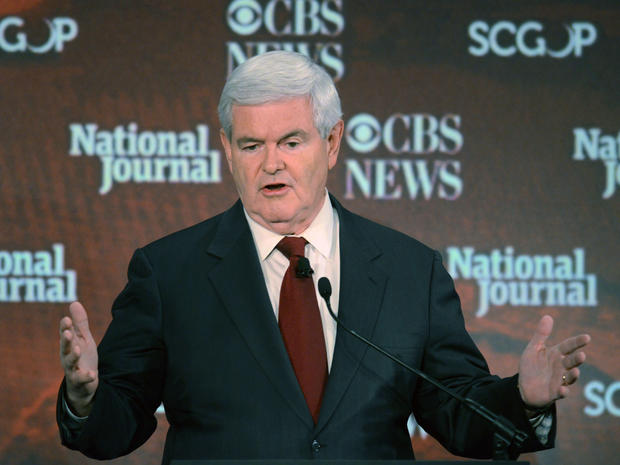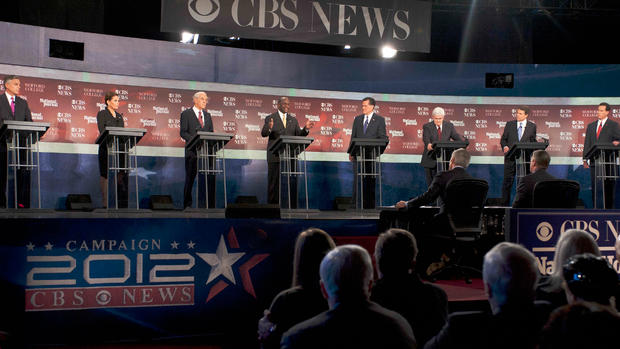The Newt Gingrich surge: Can it last?
Newt Gingrich is having his moment. After a disastrous campaign rollout, a new CNN/ORC international poll shows Gingrich in a statistical tie with Mitt Romney atop a survey of which presidential candidate Republicans and Republican-leaning independents favor. (Romney was at 24 percent, Gingrich up to 22 percent - within the poll's margin of error. Herman Cain was third at 14 percent, down 11 points from October.) Gingrich was also competitive with Romney and Cain in CBS News' Friday polland is atop a Public Policy Polling survey out Monday. (It should be noted that the PPP poll was taken using automated telephone interviews, which CBS News considers less reliable than personal interviews.)
Gingrich's roots in two early-voting states - Iowa and South Carolina - put him in a strong position to contend in those states. One new poll shows Gingrich tied with Cain atop the polls in Iowa, and an Insider Advantage survey taken November 8 showed Gingrich in second place in South Carolina, just seven points behind Cain.
Gingrich's recovery is undoubtedly tied to the fact that his rivals for the anti-Romney slot in the race have made something of a habit of self-destruction. But it's also notable that Gingrich has managed to turn his unfavorable ratings completely around among Republicans.
When Republicans (as opposed to Republicans and GOP-leaning independents) were asked in the new CNN/ORC poll their impression of Gingrich, 61 percent described it as favorable - the highest of any GOP candidate, and a ten point improvement from June. (Romney, at 55 percent, was the only rival to come close.) Just 21 percent had an unfavorable impression of Gingrich.
The finding is particularly striking in light of the fact that there was a point during the race - after Gingrich criticized Paul Ryan's Medicare plan - when many in the party considered Gingrich a force for ill. You'll recall back in May an angry Iowan confronted Gingrich for suggesting Sunday that the Ryan budget, passed earlier this year by House Republicans, amounts to "right-wing social engineering."
"Why don't you get out [of the presidential race] before you make a bigger fool of yourself?" the voter asked. For Gingrich, who maintained even when he was at 4 percent in the polls that he was playing the long game and had nothing to worry about, the improvement in Republican perceptions of him must be particularly sweet. And he's surely enjoying the fact that he is now polling higher than Perry, whose campaign many of his staffers joined after leaving a Gingrich campaign they cast as a sinking ship.
Gingrich's recovery will mean greater scrutiny for the former House Speaker, however, and not just on his former line of credit at Tiffany's, an embarrassment earlier in the campaign. As Romney pointed out in a recent debate, Gingrich once embraced the individual health care mandate - the very position that many Republicans use to criticize Romney, whose Massachusetts health care law included such a mandate.
More broadly, Gingrich's rise raises questions about to what degree Americans remember the political battles of the 1990s - and Gingrich's role in them. Gingrich argues that the government shutdown wasn't bad for Republicans. That remains an open question. But as Gingrich comes under the microscope, the question will be - What do people remember? And how much will stick to him?
One matter that might come back into focus is Gingrich's claim that the government shutdown that happened on his watch could be partially attributable to then-President Bill Clinton's snub of him on an airplane ride. If Gingrich is the nominee, he will be running both against President Obama and against Mr. Clinton, a masterful politician with perhaps a better understanding than any Democrat of what makes Gingrich tick.
Along these lines: If Gingrich replaces Cain as the anti-Romney in the GOP race, it'll mark a thoroughly Washington candidate replacing a thoroughly anti-Washington candidate. Gingrich is promising radical change, and he will undoubtedly cast himself as something of an outsider, but that's a tough sell for a man who has spent the past two decades as arguably the consummate creature of Washington. It's also worth noting that at a time when many Americans are struggling, it's unclear how big an appetite they have for the enormous changes that Gingrich is vowing to push through if elected.
Then there's Gingrich the individual. In debates, the former speaker has come across as very intelligent but also very aware of that intelligence - you get the impression he finds nearly everyone he deals with to be more than a little bit stupid. (No doubt he would feel the same way about this story.) On the debate stage, he has largely refrained from attacking his rivals - a smart strategy at this point, since negative attacks in a multi-candidate field are particularly likely to backfire. Yet that may well change as the field narrows, and Gingrich could have a hard time avoiding coming across as arrogant and overconfident as he takes aim at his rivals.
Which brings us to Gingrich's personal life. Gingrich has been married three times, and has acknowledged having an affair with his current wife while still married to his second. In addition, his first wife, Jackie Battley, claims Gingrich discussed divorce with her while she was in the hospital recovering following cancer surgery.
The good news here for Gingrich is that social conservatives in states like Iowa aren't' what they used to be; like all Republicans, they seem more concerned with the economy than they do social issues. Still, the details of his past marriages could hurt him with swing district suburban women who decide elections. And Gingrich's attempts to explain his past behavior - he said in Marchthat his past indiscretions were driven in part by "how passionately I felt about this country." - suggest he hasn't quite figured out how to deal with the issue.

